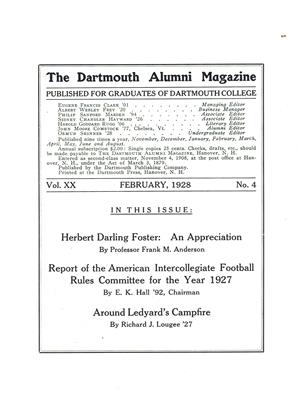Instructor in Geology
That night the moon would be full! What an opportunity! At intervals all winter the idea had recurred to my mind to try John Ledyard's experiment—spending a winter night blanketed under a drift of snow. Why not duplicate the stunt exactly as old John had originally done it by going to the traditional spot at the summit of A elvet Rocks 1 The plan was at least feasible since it had been successfully accomplished a hundred and fifty years before. Luckily two classmates, Chuck Field and Bob Barkelew responded enthusiastically when asked to come along. No one else could be found who was anxious to go on the adventure but three would prove a convenient number in such an affair.
Plans went smoothly from the start. The big round moon came up in a glorious flood of pale white light, and the sky was crystal clear. At ten o'clock the three adventurers assembled at the north entrance of Reed Hall with a toboggan to carry the duffle which consisted of a tarpaulin, three blankets, six sheepskin coats, a snow shovel, and a basket into which were thrown the flashlights, cameras, and incidental paraphernalia.
Just as we left the dorm the temperature stood exactly zero, and our courage suffered accordingly, but there was no stopping now. Bundled in our warmest togs we marched out of town pulling embedding behind us, and whistling to keep up our spirits. The last street lights were passed, and finally we left the road and began our arduous climb. The real work had - begun. Up, up, constantly steeper became the hill. The dead weight of our toboggan hung from ropes thrown over the shoulders of two men in front, while the third man pushed on all fours behind. Gradually the work became a struggle. Shirts and coats were discarded, and naked to the waist we grunted and fought every foot of the way. Sweat poured from steaming skin, and glistened in the moonlight as it trickled down the creases of our backs, yet the bitter cold was never noticed.
Half of the climb was thus completed when the town clock boomed midnight. The steepest part was still ahead, and at our present rate we would not get to the top before morning. A council was called, and it was decided to abandon most of the load, and make a dash for the top with just the bare necessities. We dug a hole in the snow, and dumped in three sheepskins and the blankets, throwing the toboggan on top. It was a dubious proceeding, but we had misjudged the weight to be carried, and now half of the original must suffice.
Struggling on up the last half mile, sometimes sinking to the waist at every step as we carried our bedding over our shoulders, we finally reached the top at one o'clock. Yet it was worth it! Down below us lay Hanover bathed in bright moonlight, and twinkling with innumer- able street lights, while far to the west the Green Mountains showed faintly. Without the lights, without the tiny houses: this was the view that John Led- yard had seen a hundred and fifty years before, supposedly from the same spot. There was little time to soliloquize. We set to work breaking the crust, and laid down the tarpaulin. After putting on all our available clothing, including the sheepskin coats, we removed our shoes and crawled between the sheets, the last man to turn in tossing a pile of snow over the bed.
I have previously said the night was cold, and before morning we were well convinced of this. At best we, did little more than doze, and at intervals we opened our eyes hoping for the dawn only to see that the moon had moved a few degrees farther west than when we had looked before. At last moonlight and daylight began to blend, and finally long sunbeams shone through the low bushes beside us. We arose, stretched, and took our morning exercise by trying to get frozen boots on our feet; and after snapping a few hurried pictures we beat a hasty retreat. The descent of the slopes up which we had labored so strenuously the night before was made in fast time, and we returned to Hanover prepared to do justice to a hot and hearty breakfast.
Dawn at Ledyard's Campsite Photograph by D. N. Field '27
Footnote: In midwinter of 1772-1773, Ledyard, with Wheelock's consent, persuaded several of the students to camp out with him in the snow in the wilds of the "Velvet Rocks," two miles east of the college. The snow was three feet deep, and drifted. The 'party went in couples on snowshoes, and reached the summit with some labor, built a fire, ate their supper, and each couple prepared for the night by scraping away the snow, and laying a bed of evergreen boughs and a blanket. One then lying down, his partner drew over him a second blanket and buried him in snow, and then crawled in by his side. They passed, they said, quite a comfortable night, and were at home in time for prayers by candle-light in the morning. Chase, "Hist, of Dart. Col."
 View Full Issue
View Full Issue
More From This Issue
-
 Sports
SportsREPORT OF THE AMERICAN INTERCOLLEGIATE FOOTBALL RULES COMMITTEE FOR THE YEAR 1927
February 1928 By E. K. Hall '92 -
 Lettter from the Editor
Lettter from the EditorEditorial Comment
February 1928 -
 Article
ArticleHERBERT DARLING FOSTER An Appreciation
February 1928 By Frank M. Anderson -
 Class Notes
Class NotesClass of 1918
February 1928 By Frederick W. Cassebeer -
 Class Notes
Class NotesClass of 1921
February 1928 By Herrick Brown -
 Article
ArticleCOLLEGE NEWS
February 1928










